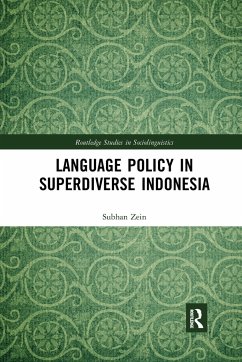
Routledge Handbook of Japanese Sociolinguistics
Versandkostenfrei!
Versandfertig in 6-10 Tagen
49,99 €
inkl. MwSt.
Weitere Ausgaben:

PAYBACK Punkte
25 °P sammeln!
Presenting new approaches and results previously inaccessible in English, the Routledge Handbook of Japanese Sociolinguistics provides an insight into the language and society of contemporary Japan from a fresh perspective.While it was once believed that Japan was a linguistically homogenous country, research over the past two decades has shown Japan to be a multilingual and sociolinguistically diversifying country. Building on this approach, the contributors to this handbook take this further, combining Japanese and western approaches alike and producing research which is relevant to twenty-f...
Presenting new approaches and results previously inaccessible in English, the Routledge Handbook of Japanese Sociolinguistics provides an insight into the language and society of contemporary Japan from a fresh perspective.
While it was once believed that Japan was a linguistically homogenous country, research over the past two decades has shown Japan to be a multilingual and sociolinguistically diversifying country. Building on this approach, the contributors to this handbook take this further, combining Japanese and western approaches alike and producing research which is relevant to twenty-first century societies. Organised into five parts, the sections covered include:
The languages and language varieties of Japan.
The multilingual ecology.
Variation, style and interaction.
Language problems and language planning.
Research overviews.
With contributions from across the field of Japanese sociolinguistics, this handbook will prove very useful for students and scholars of Japanese Studies, as well as sociolinguists more generally.
While it was once believed that Japan was a linguistically homogenous country, research over the past two decades has shown Japan to be a multilingual and sociolinguistically diversifying country. Building on this approach, the contributors to this handbook take this further, combining Japanese and western approaches alike and producing research which is relevant to twenty-first century societies. Organised into five parts, the sections covered include:
The languages and language varieties of Japan.
The multilingual ecology.
Variation, style and interaction.
Language problems and language planning.
Research overviews.
With contributions from across the field of Japanese sociolinguistics, this handbook will prove very useful for students and scholars of Japanese Studies, as well as sociolinguists more generally.














